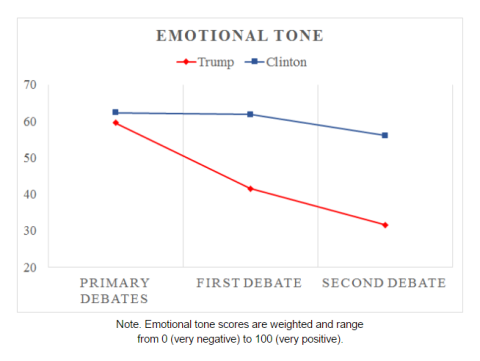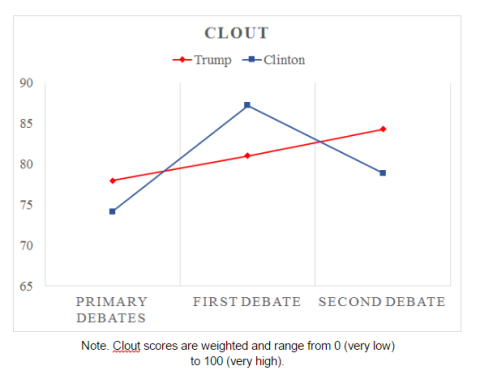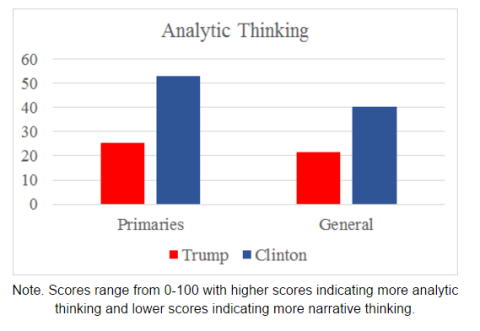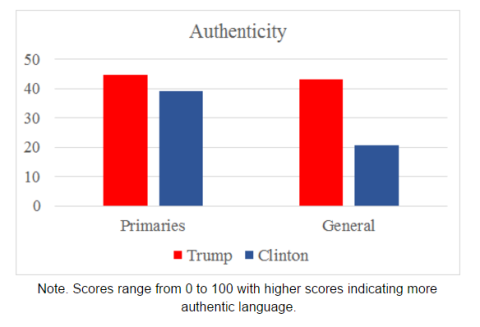A Look into the Second Clinton-Trump Debate
October 10, 2016
Kayla N. Jordan and James W. Pennebaker
University of Texas at Austin
After one of the biggest scandals of the election season so far, Hillary Clinton and Donald Trump met in debate for the second time. While Clinton has seen substantial gains in the polls since the first debate, Trump has been steadily losing ground with many of his own party withdrawing support in the days after the latest scandal. Did these changes in the campaigns affect the candidate’s in last night’s debate? Here we examine how the tone of the candidates as well as their sense of status may have shifted.
Emotional Tone
As with the first debate, both of the candidates launched attacks on their opponent. There were even questions addressing the negativity in the current election. Did the language in the last debate show any increasing negativity?
The graph below shows how the candidates’ emotional tones have shifted from the primary debates to the first general election debate to the most recent debate. The language of both candidates in the primaries was relatively optimistic and upbeat. As they headed into first debate with Trump trailing in the polls, Clinton maintained that sense of optimism whereas Trump’s language took a pessimistic turn. In the latest debate, Trump fell further into negativity where Clinton retained her positivity.

Clout
People who are high in clout speak confidently with a sense of certainty. They tend to use we-words and social words more while using I-words, negations (e.g. no, not), and swear words less.
Historically, both Trump and Clinton have addressed their audiences with a relatively high degree of confidence. While they were still battling their primary opponents at the time, both were consistently in the top of the field lending a sense of power in their position. In the first Clinton-Trump debate, Clinton’s word usage suggested a greater sense of status or power whereas Trump’s language was more hesitating and weak. In last night’s second debate, the candidates’ language styles reversed. Despite his recent difficulties, Trump’s words revealed greater confidence that Clinton’s.

The Big Picture
With little time left before election day, the candidates are running out of time to gain votes. Given numerous difficulties, both are dealing with the fallout and managing voters’ perceptions. The ways in which their language has shifted suggest different reactions to their campaigns’ problems.
Donald Trump is speaking with increasing certainty and confidence but, at the same time, revealing darker and more pessimistic tones. While Trump’s scandals have garnered more attention, Hillary Clinton is not without problems of her own. In contrast to Trump, she is maintaining an optimistic tone but speaking with less certainty.
Linguistic features of candidates are very poor predictors of their electability. Sometimes we want a warm, approachable leader and other times we want a no-nonsense autocrat. Sometimes, we just want a change. Just paying attention to their words can tell us a great deal about their personalities but much less how effective they will be in governing a nation.
The 2016 election cycle has baffled researchers across the political spectrum. Donald Trump is an aberration rarely seen at the highest levels of politics. Linguistically, he is authentic and supremely confident but at the same time simple and not concerned with logical or formal reasoning. There are times when we seek someone like this. If we are buying a new car and we know nothing about cars, the salesperson who comes across as authentic, confident, and doesn’t bog us down with details can be extremely appealing. And if the salesperson assures us, “trust me, I know more about cars than anyone”, how could we go wrong?
Trump’s appeal gets at the heart of the human psyche. In an increasingly complex world, no one has an great understanding of the implications of major decisions. Every political, economic, or policy change has major unintended consequences that overwhelm some of the greatest minds of our generation. At some point, many of us simply turn to that confident new voice that promises a simple, straightforward solution that is guaranteed to work.
A Look into the First Clinton-Trump Debate
September 27, 2016
Kayla N. Jordan and James W. Pennebaker
University of Texas at Austin
This week Hillary Clinton and Donald Trump met on the debate stage for the first time. In looking at their language so far, we have found the candidates to be remarkably consistent with their earlier primary debates in their language styles. Throughout their campaigns both candidates have faced numerous challenges to their temperaments and their honesty. Given the perceptions of their weaknesses, the candidates may have tried to change how they approached the debate their first presidential debate. We examine two ways the candidates may have changed: (1) are they more analytic or more narrative and (2) are they more authentic or more distant?
Analytic Thinking
As we have discussed in previous posts, people differ in the ways they think. Some people think in a formal, logical manner indicated by the greater use of nouns, articles, and prepositions. Others rely more on stories and narrative communicating in an informal manner using more pronouns, auxiliary verbs (e.g. is, have, was), and common adverbs (e.g. really, so, very).
During the primary debates, Clinton spoke using a formal, analytic style. She focused on her policy proposals and issues and laid them out in a logical fashion. Trump had a shoot-from-the-hip, informal way of speaking using stories and anecdotes to explain his thinking. Have their thinking styles changed? In Trump’s case, no. As you can see in the graph below, his numbers are virtually identical. Trump remains very much a narrative, intuitive thinker. Clinton, on the other hand, was more narrative than normal at this debate getting closer to Trump’s thinking style. Given her opponent and some of the criticisms she has faced, Clinton may have tried to be more personable and less formal to better appeal to voters.

Authenticity
The words people use also reflect how authentic or personal they sound. People who are authentic tend to use more I-words (e.g. I, me, mine), present-tense verbs, and relativity words (e.g. near, new) and fewer she-he words (e.g. his, her) and discrepancies (e.g. should, could).
In the primary debates, both Trump and Clinton came across as relatively authentic and personal though Clinton was a bit more distant. Have the candidates changed? Once again, Trump has changed very little since the primaries. He is still speaking his mind in straight-forward, authentic way. Clinton, however, has changed rather dramatically. After a few recent scandals, it is perhaps somewhat unsurprising that Clinton has become more distant and inauthentic.

The Big Picture
As Clinton said in the debate, “words matter.” Indeed, the words people use reveal important facets about them. So what does the debate language of Clinton and Trump say about them?
Clinton. Clinton’s language has changed the most from the primary debates. She went from being analytic to more narrative and from relatively authentic to rather distant. By all accounts, she spent quite a bit of time preparing for the debate to change the way she speaks to address criticisms she has faced. Her drop in authenticity could be a result of consciously altering how she normally speaks. Her drop in authenticity may also give people a sense of her being more authoritative. Given the way she has been criticized for not being open (despite often being more accurate than Trump according to fact checkers like CNN and PoliFact), shifting back to her more honest style might be in order.
Trump. When not reading from a script, Donald Trump is remarkably consistent. Trump says what he thinks and believes in what he says. Unlike Clinton, Trump did not seem to spend much time preparing for the debate. For better or worse, Trump is who he is and may not change to court new voters or change people’s perceptions.
Kayla N. Jordan and James W. Pennebaker
University of Texas at Austin
Donald Trump and Hillary Clinton are officially rivals for the 2016 presidential election. Their acceptance speeches at their respective party conventions demonstrated the stark contrast between the two candidates. In this post, we look at three major points of divergence: the emotional tone of their speeches, the certainty they have in their beliefs, and the focus they place on power, affiliation, and achievement.

Emotional Tone
The most obvious difference between the two speeches was their tones. During the primary debates, Trump tended to be relatively positive and upbeat, but during his acceptance speech, Trump was uncharacteristically negative and pessimistic. Trump painted a dark portrait of the world. To him, the current outlook is bleak, and we have to “make America great again.” After several years of Democratic leadership, he argued that much must be changed in order to fix the country and set it on the right path.
Clinton, on the other hand, gave an upbeat, optimistic speech. Her language during the debate season was generally positive and optimistic, and her acceptance speech was even more so. For all the problems left to be solved, the nation is in a fundamentally good place. No matter what might be going wrong, people are capable of working hard and accomplishing great things. For Clinton, the American people should continue striving along the current path for progress.
Using our text analysis program LIWC, we simply calculated the percentage of emotionally-tinged words within the two acceptance speeches. An emotional tone variable was created where a score of 100 would reflect a perfectly positive upbeat use of language and a score of 0 would be completely negative. A score of 50 reflects an equal balance of positive and negative emotionally-related words. Across all previous debates this season, both Trump and Clinton have received tone scores around 60.

As depicted in the graph, Clinton’s language increased in positive tone from her debates whereas Trump’s became decidedly more negative. If you look back over our previous posts this election season, Trump’s score of 30 is lower than the majority of other politicians for any single debate; only 13% of politicians in debates had lower scores.
Belief Certainty
In addition to their emotional tones, another area in which Trump and Clinton differ significantly is belief certainty. When people are working through issues, they tend to use words like think, believe, and know which reflects cognitive processing. People who are no longer working through issues or who are more certain in their beliefs use these words less. In the graph below, we compared the candidates’ use of cognitive processing words to all the politicians in the primary debates and conventions. The numbers in the graph reflect the percentage of politicians who used more cognitive processing words than a given speech. Hence, higher scores indicate more certainty and lower scores more processing. For example, a score of 95 would indicate the 95% of all other speakers used more cognitive processing words.
Trump is more certain in his beliefs now than in the primary debates. Trump may have still been working out some of his beliefs in the primaries, but his acceptance speech indicates he has become more entrenched in his positions. Now, he doesn’t need to process his positions; he already knows what he thinks. Above everything, Trump uses language like he has the answers to the problems he is faced with.
Clinton’s language, on the other hand, is indicative of someone who may still be working through issues. While she was processing problems more during the primary debates, compared to Trump, she was still trying to understand issues. As was seen in the primary season, she engaged with the issues and her opponent, Bernie Sanders, shifting her positions to better match voters’ attitudes. Clinton knows her beliefs, but is more willing to think about alternate viewpoints and change her opinions.

Power, Affiliation, and Achievement
Finally, Trump and Clinton have different motivations that drive them. As we have discussed in previous posts, people naturally differ in the extent to which they are guided by their focus on power, achievement, and affiliation. Those concerned with power judge themselves and others by their relative status and influence. Those driven by needs for affiliation are more concerned with having and making friends and allies. Those focused on achievement use words that reflect topics such as ambition, trying, and success or failure.
Relative to Clinton, Trump is concerned with power and status. This can be seen in statements like: “It’s time to deliver a victory for the American people.” and “It is time to show the whole world that America Is Back – bigger, and better and stronger than ever before.” In the primary, Trump had relatively little concern for power. Now that he has secured the nomination, power is more central to his thoughts.
Clinton makes more references to affiliation and achievement. It was clear she was distinguishing herself from Trump responding, “We’ll fix it together,” showing the value she places on cooperation rather than power. Clinton was more oriented toward social relationships in general. She spent time connecting to other Democrats, thanking Bernie Sanders, Barack Obama, and Joe Biden for their work. Based her language, Clinton isn’t thinking about the power others have, but rather on what they get done and how well they work with others.

Summary
Compared to their language in the primaries, both candidates shifted their language in accepting their party’s nomination. Since becoming the official nominee, Trump changed rather dramatically from being relatively optimistic to being quite pessimistic. Was this new negative tone a calculated strategy to turn voters against the Democratic party? Or did it reflect some kind of psychological turning point that signaled his own his own anxieties or insecurities? His convention speech was also striking in that he used language with much greater certainty than ever before. During the primary debates, Trump was remarkably low in concern for power, but his acceptance speech revealed a strikingly high focus on power and status.
Clinton’s language changed less from the debates to the convention. Her convention speech was even more optimistic than in the debates. Like Trump, she was slightly more certain in her beliefs during the convention after working out the party platform. Even more so than the debates, Clinton is concerned with affiliation and achievement. Going into the general election, Clinton’s language is focused on accomplishing her plans and working with those who have supported her.
From a personality perspective, the convention acceptance speeches said a great deal about both candidates. Clinton’s language use was consistent with what we have seen from her in the last year and, indeed, since she ran for president eight years ago. Across time and context, her language has reliably revealed optimism, awareness of different perspectives, and a focus on friends and achievement. In comparison, Trump’s speech was a fundamental departure from the past in the ways he has used words. Normally optimistic, his convention speech was starkly pessimistic. Normally, acknowledging different perspectives, his convention language conveyed belief, unwavering certainty. Normally low in power orientation, his speech was quite high.
The Final Obama-Romney Debate
October 22, 2012
by James W. Pennebaker and Cindy K. Chung
Pundits are reporting that the third debate on foreign policy was a toss-up, perhaps with a very slight edge in Obama’s favor. The stubbornly objective computerized text analysis program, LIWC, refused to name a winner. But in counting different types of words by Obama and Romney, LIWC revealed some word patterns that tell us a little more about the two candidates.
The candidates as communicators: businessman versus professor. Romney and Obama break down ideas and express them in very different ways. They simply think differently.
Across the debates, Romney uses shorter words and shorter sentences. He tends to be more concrete, breaking problems into more precise categories. Compared to Obama, he uses a high rate of articles (a, an, the) which reflects his reference to concrete nouns. These nouns are well organized; by his high use of prepositions and specific references to spatial words (above, around, below, outside), Romney provides a roadmap of his thoughts.
Obama tends to be a more theoretical communicator. His sentences are much longer, his words bigger, and he is much less personal. Unlike Romney, Obama often sets up a context for his thoughts. Look at the way he often starts a response to a question: “Well, my first job as commander in chief, Bob, is to keep the American people safe. “; “You’ve got to be clear, both to our allies and our enemies, about where you stand and what you mean.“; “When I came into office, we were still bogged down in Iraq and Afghanistan had been drifting for a decade.”
Compare those first sentences to some of Romney’s: “Well, my strategy is pretty straightforward, which is to go after the bad guys…“; “I don’t want to have our military involved in Syria. I don’t think there is a necessity to put our military in Syria at this stage.” “Well I believe we should use any and all means necessary to take out people who pose a threat to us and our friends around the world.”
Obama thinks about a problem within a broader context; Romney tends to answer questions directly and then brings up contextual matters after the fact. These two types of thinking are likely to lead to very different strategies in decision making. A contextual thinker will likely spend more time looking at a problem from multiple perspectives. A more categorical thinker will likely have a more set world view and simply make decisions from pre-existing values or beliefs.
Ultimately, the two candidates are revealing their backgrounds. Romney is a businessman with a clear sense of economic realities, and a bottom line. Obama is, at heart, an academic — a world where there are multiple ways to get at truth, and so competing views must be acknowledged.
Candidates as people: social relationships versus achievement. Despite the nastiness of the 2012 presidential election, both candidates have come across as honest, decent people. They both appear to have warm and stable families. One thing that a text analysis method can help uncover are some of the basic values that are central to candidates. Across the debates, the two men have made references to money, religion, death, and family at similar rates. Two language dimensions that have emerged are references to other people and references to achievement and work.
One dimension of the LIWC program counts references to anything social — people, conversations, friendship, or anything that suggests an interest in or awareness of other people. Within each of the three debates, Obama has consistently used social words about 10% more frequently than Romney. In his mind, the current economic difficulties are a problem because they hurt people.
Romney, on the other hand, has consistently used words that suggest achievement (e.g., earn, success, win). Not surprisingly, Romney has also made greater references to the related dimension of work. Work words include a variety of more economically-relevant words such as job, paycheck, and company. Whereas Obama views economic difficulties as people-problems, Romney frames the recession as something that undermines achievement, jobs, and progress.
Obviously, a recession is bad for companies and for people. But the framing of the problem reveals differences in core values about people and human nature. Ultimately, it likely drives what each believes to be the most effective solution.
The debate language of Obama and Romney. It should be noted that debates are a very peculiar interaction in which to study language use and personality. Although many labs and companies have examined the men’s language use, body language, and voice characteristics, we are most impressed by how similar the two really are. They are both smart, eloquent, formal, and trustworthy.
The analysis of pronouns and other function words is helpful in revealing how people are speaking or thinking. LIWC can also give insight into personalities and even central values. The degree to which Americans agree with what the candidates are saying remains to be determined in the upcoming elections.